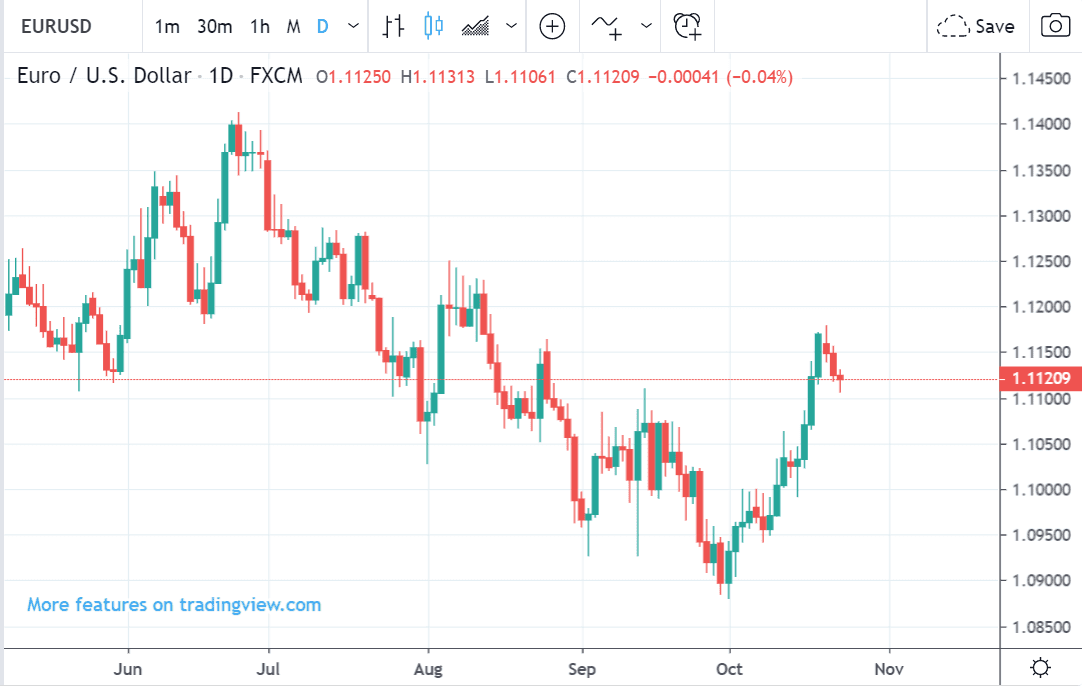Euro a Buy on Dips vs. Dollar: Citibank

Image © European Central Bank
- EUR/USD to continue recovery
- Euro to rise as monetary policy hits lower bound
- U.S. data worsening and global macro factors also hitting
The Euro-to-Dollar exchange rate, which has risen strongly in October, is expected to continue, says Citibank, and is a "buy on dips" candidate.
The Euro is expected to outperform the U.S. Dollar as conditions in the Eurozone improve and a combination of several factors weaken the U.S. Dollar.
The Euro is set to gain mainly as a result of monetary policy finding a floor and negative interest rates unable to go any lower.
The European Central Bank (ECB) is unlikely to cut interest rates further since it could harm the fragile Eurozone banking system.
Since lower interest rates are generally negative for a currency because they reduce foreign capital inflows, the cessation of further cuts is positive for the Euro.
Indeed, it seems the heavy lifting of stimulus will pass to Eurozone governments who will use fiscal spending to try to drive growth, which is likely to conversely strengthen the Euro.
A recovery in dismal German data is a further factor which could support the Euro, says Citi.
German manufacturing PMI will move up to 43.0 and the Ifo business confidence survey, which is often taken as a leading indicator for the economy, should show a “slight improvement”. The improvements in sentiment are all the more likely now the outlook for Brexit has improved.
At the same time, the U.S. Dollar is set to weaken amidst a host of headwinds.
Domestic data has not been very positive recently and suggests evidence the slowdown in manufacturing may be infecting the wider economy.
“US domestic data continues to come in on the disappointing side,” says Citi, “as shown by US retail sales and industrial production last week and housing data overnight (the 2.2% drop in September existing home sales to 5.38m is somewhat larger than the Citi and market consensus).”
The strong pillar of the U.S. economy at the moment is the U.S. consumer who has continued spending undaunted by the slowdown in manufacturing and trade.
If signs continue to show consumers tightening their belts, however, the Dollar will likely fall amidst broader recessionary concerns.
The Federal Reserve (Fed) in contrast to the ECB is likely to cut interest rates which are relatively high at 2.00% compared to the ECB’s 0.00%.
The result will be increased downwards pressure on USD.
“With the Fed looking set to cut interest rates again next week, and further cuts impossible to rule out, USD continues to underperform,” says Citi.
The IMF is pessimistic about the trajectory of the U.S. economy too and if their prognostications come true this could weigh on the currency.
At the recent 2019 IMF-World Bank Annual Meeting “participants note that USD outperformance is receding,” says Citibank.
There is even talk of the US “catching up with global weakness” as if its period of anti-cycle exceptionalism is fading.
Finally, recent discussions amongst world leaders and policymakers about the over reliance of the world financial system on the Dollar, due to its status as the global reserve currency, and its use in commodity trading, suggests impending global regulatory shifts.
This is especially likely to be the case since perennial Dollar over-appreciation tends to cause trade imbalances and the U.S’s historically high trade deficit.
Indeed, U.S. president Donal Trump has complained on more than one occasion about the overvalued Dollar.
One way to help deal with the problem would be to reduce the world’s reliance on the greenback.
“Discussion of reducing reliance on the US and USD in the international system now also appear commonplace with several highlighting that the desire to diversify could be difficult to reverse and could have more serious consequences in the long run,” says Citibank.
Time to move your money? Get 3-5% more currency than your bank would offer by using the services of a specialist foreign exchange specialist. A payments provider can deliver you an exchange rate closer to the real market rate than your bank would, thereby saving you substantial quantities of currency. Find out more here.
* Advertisement





